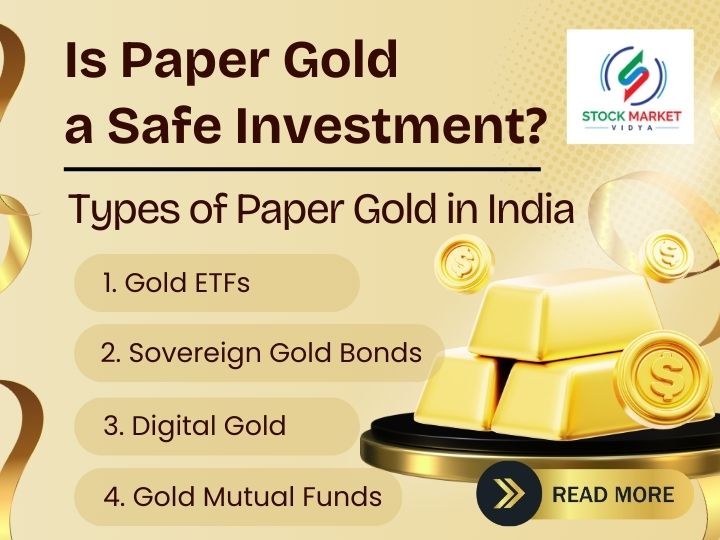When we talk about gold in India, emotions always come into the picture. For centuries, gold has been seen as a symbol of wealth, safety, and prosperity. Traditionally, people preferred to buy physical gold in the form of ornaments, coins, or bars. However, with the advancement of the financial market and digital economy, investors today have another option – Paper Gold.
But the key question is – Is paper gold really a safe investment? Let us explore this topic in detail and understand how it works, its pros and cons, and whether it can be considered a secure option for investors.
What is Paper Gold?
Paper gold refers to financial instruments that allow you to invest in gold without physically holding it. Instead of buying gold bars or jewelry, investors purchase certificates, digital gold, exchange-traded funds (ETFs), or sovereign gold bonds that represent the value of gold.
This form of investment eliminates the hassle of storing and securing physical gold while still giving you exposure to gold’s price movements. In simple terms, you own gold on paper, not in your locker.
Why Do Investors Choose Paper Gold?
Gold has always been considered a hedge against inflation and market volatility. In uncertain times, people turn to gold as a safe haven. But physical gold comes with problems like making charges, purity checks, and storage costs. Paper gold solves these issues and provides:
- Convenience: No Need to Store or Safeguard Gold
One of the biggest concerns with physical gold is storage and safety. People usually keep jewellery in lockers, which involves annual maintenance charges, or at home, which comes with security risks. With paper gold, these worries vanish. You don’t need a bank locker, insurance, or constant vigilance. Your gold holdings exist in digital or certificate form, backed by financial institutions or the government in the case of Sovereign Gold Bonds. This convenience makes paper gold especially attractive to young investors, professionals, and even those learning about wealth creation in share market classes.
- Liquidity: Easy to Buy or Sell Through Online Platforms and Stock Exchanges
Physical gold often requires visiting a jeweller, checking for purity, negotiating rates, and paying additional charges. Selling it back may even result in losses due to deductions. Paper gold changes this scenario entirely. You can buy or sell gold ETFs on stock exchanges in just a few clicks, redeem digital gold instantly through mobile apps, or sell Sovereign Gold Bonds on secondary markets. This high liquidity ensures that your money is never locked up unnecessarily and can be quickly converted into cash when needed. For traders undergoing stock market training, this feature aligns perfectly with the need for flexibility in managing funds.
- Transparency: Prices Are Linked to International Gold Rates
In the physical market, prices vary depending on the jeweller, region, and even hidden making charges. Investors often don’t get full value for their money. In contrast, paper gold eliminates these discrepancies by being directly linked to international benchmark rates. Whether you invest in ETFs, mutual funds, or SGBs, the price you see is the price you get. This transparency builds investor confidence and ensures fair play. Students pursuing a stock market course in Nagpur often find this aspect useful when learning about global financial linkages and price discovery.
- Small Ticket Investment: Start with as Little as ₹100 in Digital Gold
Physical gold demands a significant outflow of money, especially if you want to buy jewellery or coins. Many middle-class investors hesitate because of this financial burden. Paper gold democratizes access by allowing small-ticket investments. For instance, with digital gold, you can start with as little as ₹100, making it ideal for beginners or those who want to gradually build their portfolio. This feature is also a stepping stone for new investors who may later move on to more advanced assets after joining a share market course near me or advanced share market training programs.
Types of Paper Gold in India
To understand the safety aspect, it’s important to know the forms of paper gold available in India:
1. Gold ETFs (Exchange Traded Funds)
Gold ETFs are listed on stock exchanges and track the price of gold. One unit of a gold ETF usually represents one gram of gold. Investors can buy or sell them just like shares.
2. Sovereign Gold Bonds (SGBs)
Issued by the Reserve Bank of India (RBI), SGBs are government-backed securities. Along with the gold price appreciation, they also provide interest (currently around 2.5% annually).
3. Digital Gold
Offered by fintech companies, digital gold allows you to buy and sell gold online in small amounts. The gold is stored with secure vaults on your behalf.
4. Gold Mutual Funds
These mutual funds invest in gold ETFs and are managed by fund houses. Investors who do not want to deal directly with ETFs can opt for these funds.
Types of Paper Gold in India
To fully evaluate whether paper gold is a safe investment, it is essential to understand the different types of paper gold instruments available in India. Each comes with its own features, level of regulation, advantages, and limitations. Let’s explore them in detail:
1. Gold ETFs (Exchange Traded Funds)
Gold ETFs are one of the most popular forms of paper gold. They are listed and traded on stock exchanges, similar to shares. One unit of a gold ETF typically represents one gram of gold.
- How it Works: Investors buy gold ETFs through their Demat and trading accounts. The value of the ETF rises and falls in direct proportion to the market price of gold.
- Liquidity Advantage: Since ETFs are exchange-traded, you can buy and sell them during market hours with just a few clicks. This makes them highly liquid compared to physical gold.
- Purity Assurance: Unlike jewellery where concerns about purity and hallmarking arise, gold ETFs are benchmarked to 99.5% pure gold, ensuring transparency and reliability.
- Who Should Invest: Investors who are familiar with stock markets and already hold a Demat account find ETFs convenient. They are especially useful for those undergoing stock market training or a share market course in Nagpur, as it gives practical exposure to how financial instruments work.
2. Sovereign Gold Bonds (SGBs)
SGBs are considered the safest form of paper gold because they are issued by the Reserve Bank of India (RBI) on behalf of the Government of India. These bonds represent gold holdings in digital form and are backed by the sovereign guarantee of the government.
- Dual Benefit: Along with the appreciation in gold prices, SGB investors also earn an additional fixed interest (currently around 2.5% annually), paid directly to their bank accounts. This makes them more rewarding compared to physical gold or even ETFs.
- Lock-in Period: SGBs usually have an eight-year maturity, with an option to exit after the fifth year. While this reduces liquidity compared to ETFs, it encourages long-term wealth creation.
- Tax Advantage: If held until maturity, capital gains on SGBs are tax-free, which is a significant benefit for long-term investors.
- Safety Factor: Since SGBs are issued and regulated by the RBI, the risk of default is virtually zero.
- Who Should Invest: Ideal for investors who want safety, steady returns, and long-term exposure to gold. Many students in share market classes learn to include SGBs in balanced portfolios for stability.
3. Digital Gold
Digital gold is a relatively new but fast-growing mode of investing. Offered by fintech companies, payment apps, and even jewellers, it allows you to buy and sell gold online in very small amounts—sometimes starting from just ₹100.
- How it Works: When you purchase digital gold, the equivalent physical gold is stored in secured vaults by the provider. You can choose to sell it back online at market rates or even take physical delivery if the provider offers that facility.
- Accessibility: Digital gold makes gold investment accessible to everyone, especially young investors who cannot afford to buy large amounts at once.
- Risks: Unlike ETFs and SGBs, digital gold is not regulated by SEBI or RBI. Its safety depends on the credibility of the provider. Hence, investors must choose reputed companies.
- Convenience: Since it can be bought instantly through apps like Google Pay, PhonePe, or Paytm, it suits people who prefer quick and hassle-free investing.
- Who Should Invest: Digital gold is perfect for beginners or first-time investors who want to build small gold savings. It also serves as an introduction to wealth creation for those joining a share market course near me.
4. Gold Mutual Funds
Gold mutual funds are another way to gain exposure to gold without dealing directly with ETFs. These funds pool money from multiple investors and invest primarily in gold ETFs.
- Professional Management: Since these funds are managed by professional fund managers, investors don’t need to worry about tracking gold prices daily.
- No Demat Account Required: Unlike gold ETFs, gold mutual funds can be purchased without a Demat account. You can buy them directly through fund houses or online platforms.
- Systematic Investment Plan (SIP): Many investors prefer gold mutual funds because they can start with small monthly contributions through SIPs, making gold investment systematic and disciplined.
- Liquidity: While not as liquid as ETFs, you can redeem gold mutual fund units with the fund house at prevailing NAV (Net Asset Value) prices.
- Who Should Invest: Gold mutual funds are suitable for retail investors who are new to financial markets, do not have a Demat account, and prefer a managed approach. This is often recommended in stock market courses for those learning portfolio diversification.
Advantages of Paper Gold
- No Storage Hassles – You don’t need lockers or insurance.
- High Liquidity – Easy to buy or sell anytime.
- Affordable – Start investing with small amounts.
- Transparency – Prices linked to global markets.
- Diversification – A great way to balance your portfolio.
Disadvantages of Paper Gold
- Digital Risk – Digital gold is not yet fully regulated.
- Market Fluctuations – Prices depend on global market trends.
- Limited Physical Possession – You cannot directly use it as jewellery or ornaments.
- Tax Implications – Capital gains tax applies to paper gold.
Should You Invest in Paper Gold?
Paper gold can be a good choice for:
- Investors looking for short-term trading opportunities.
- Beginners who want to learn investing through a stock market course or share market training.
- People who don’t want the hassle of storing physical gold.
- Those seeking diversification in their investment portfolio.
However, one should carefully choose the mode – SGBs and ETFs are more reliable than digital gold due to regulation.
Paper Gold vs. Physical Gold
While physical gold gives emotional satisfaction and can be used for ornaments, it comes with storage risks and making charges. Paper gold, on the other hand, provides convenience, liquidity, and transparency.
For long-term wealth creation and safe investment, paper gold is a better option for modern investors.
Expert Viewpoint from Stock Market Vidya
At Stock Market Vidya, Nagpur, under the guidance of Mr. Prashant Sarode, students are trained to analyse different investment options. Understanding paper gold is essential for anyone who wants to master wealth management. Through structured share market classes and stock market courses, investors learn how to diversify portfolios effectively.
Paper gold is a tool that provides exposure to gold without the hassle of physical possession. With proper knowledge and training, it can be a safe and rewarding addition to one’s investment journey.
Final Thoughts
So, is paper gold a safe investment? The answer is Yes – when chosen wisely. Gold ETFs and Sovereign Gold Bonds are among the safest options, while digital gold requires careful selection of a trusted provider.
For anyone who is keen to learn about smart investment choices, enrolling in a share market course near me or joining the best share market classes in Nagpur can provide the right foundation.
Gold, whether in physical or paper form, remains a timeless asset. But for today’s generation of investors who value convenience and transparency, paper gold is a safer and more efficient choice.
Contact for Share Market Training in Nagpur
If you want to learn more about investments, trading strategies, and financial planning, connect with Stock Market Vidya, Nagpur, run by Mr. Prashant Sarode.
Mobile: 9822718163, 8421893845
Website: www.stockmarketvidya.com
Frequently Asked Questions (FAQs) on Paper Gold
1. What exactly is paper gold?
Paper gold is an investment instrument that allows you to own gold without physically holding it. Instead of buying jewellery, coins, or bars, you invest in gold ETFs, Sovereign Gold Bonds, digital gold, or gold mutual funds. These represent the value of gold on paper or digitally, making investment more convenient and transparent.
2. Is paper gold safe compared to physical gold?
Yes, paper gold is generally safe, especially in regulated forms like Gold ETFs and Sovereign Gold Bonds. These are backed by SEBI and the Government of India, respectively. Digital gold, while convenient, requires you to choose a reliable platform since it is not yet fully regulated. Compared to physical gold, paper gold removes risks of theft, purity doubts, and storage costs.
3. Can I convert paper gold into physical gold?
It depends on the type of paper gold you hold.
- Sovereign Gold Bonds (SGBs) cannot be converted into jewellery or coins, as they are only financial instruments.
- Gold ETFs and gold mutual funds also remain in digital form.
- However, some digital gold providers offer the option to take delivery of physical gold if you wish.
4. How much money do I need to start investing in paper gold?
The entry point is very low. With digital gold, you can start with as little as ₹100. Gold ETFs usually require the price of 1 gram of gold as the minimum. Sovereign Gold Bonds are sold in multiples of 1 gram. This makes paper gold accessible to everyone—from small investors to big portfolio holders.
5. Do I need a Demat account to buy paper gold?
Not always.
- Yes, you need a Demat and trading account for gold ETFs.
- No, you don’t need one for Sovereign Gold Bonds (they can be bought through banks, post offices, or online platforms).
- Gold mutual funds and digital gold can also be purchased without a Demat account.
6. Does paper gold give returns like physical gold?
Yes, paper gold reflects the same price movements as physical gold. If gold prices rise in the international market, the value of your paper gold investment also goes up. In fact, Sovereign Gold Bonds give an additional 2.5% annual interest, which makes them more rewarding than physical gold.
7. Is paper gold useful for short-term trading?
Absolutely. Gold ETFs and digital gold are highly liquid, meaning you can buy and sell them quickly through stock exchanges or apps. They are suitable for investors and traders who want to take advantage of short-term price movements.
8. Which is better: Gold ETFs or Sovereign Gold Bonds?
- Gold ETFs are better for those who want high liquidity and short-term trading opportunities.
- Sovereign Gold Bonds are ideal for long-term investors because they provide interest income and tax benefits if held until maturity.
Your choice depends on whether you want quick access to funds or long-term wealth creation.
9. Are there any tax benefits on paper gold?
Yes. Sovereign Gold Bonds provide tax-free capital gains if held till maturity. For ETFs, digital gold, or mutual funds, capital gains tax applies depending on the holding period (short-term or long-term). Always consider tax rules before choosing the right option.
10. Why should I choose paper gold over jewellery or coins?
Jewellery involves making charges, wastage, and purity concerns. Coins and bars still need secure storage. Paper gold eliminates these problems. It is easy to buy, transparent in pricing, and liquid in nature. For serious investors, paper gold is a much better financial asset than ornamental gold.



Sir quity stock 20 Dma stock not up given profit your statagy what happened